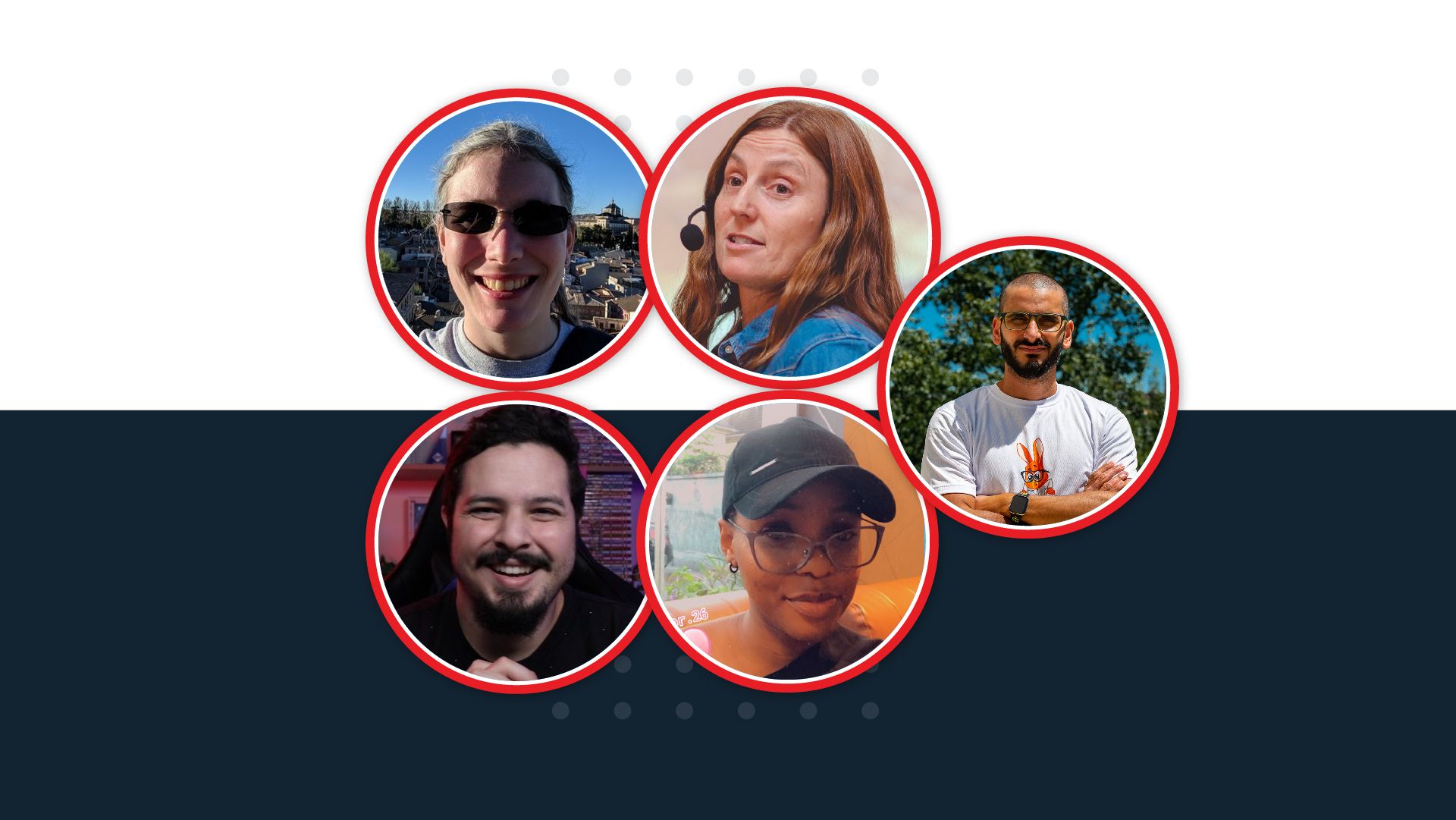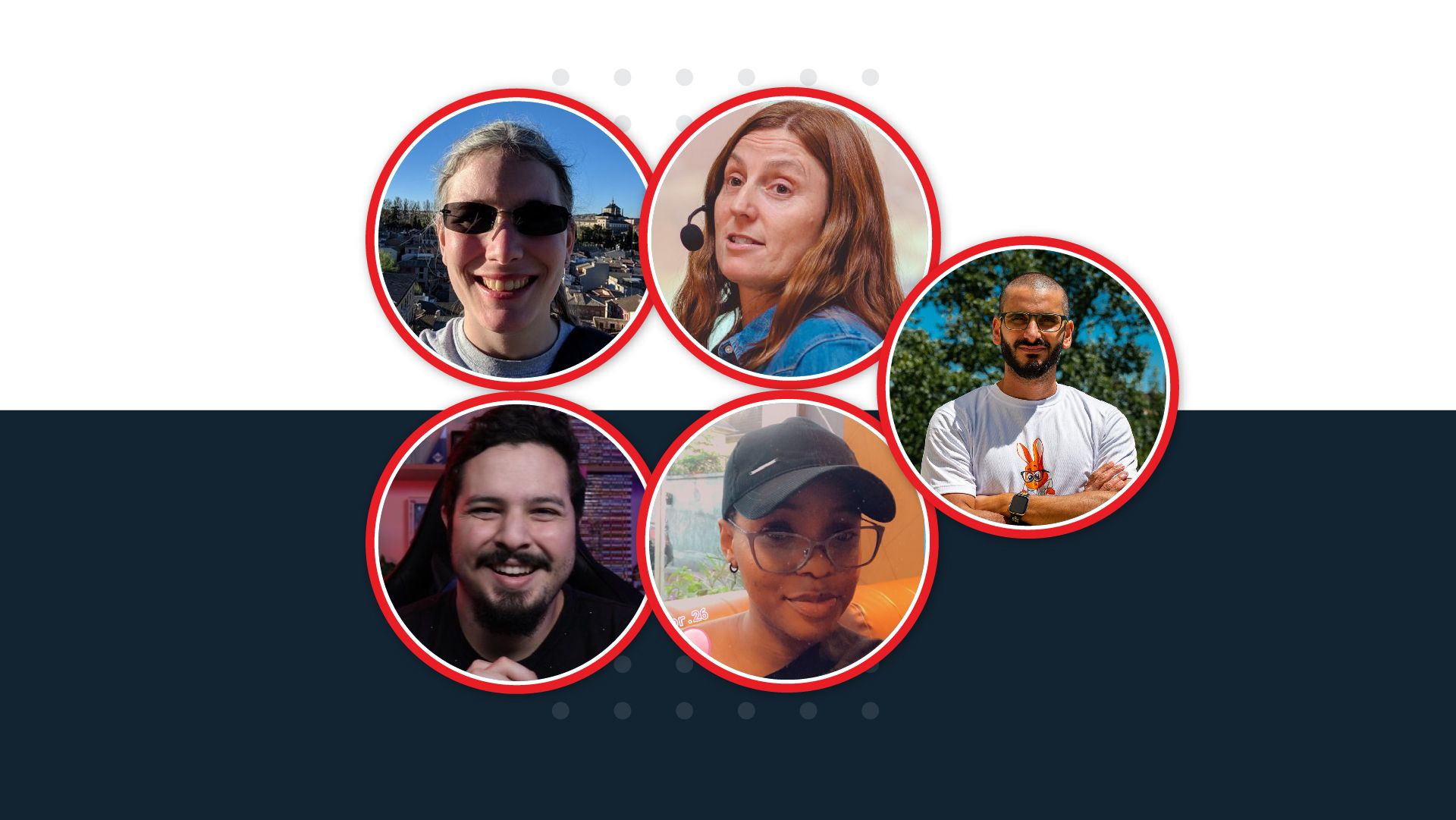By Eddie Jaoude
Ever since I became a GitHub Star and GitHub Star of the year in 2020, many people have asked me how they can become one.
There is no definitive checklist and you cannot apply or nominate yourself. But the GitHub Stars Program website gives some useful insight into what GitHub is looking for in a Star when they review the nominations they receive.
So while I can't give a precise answer to this question, I asked a few GitHub Stars to join me in a conversation to share their experiences.
I had the privilege of speaking to:
- Gina Häußge from Germany, creator and maintainer of OctoPrint
- Mario Souto from Brazil who is DevSoutinho on YouTube
- Ruth Ikegah from Nigeria, a Backend developer, and
- Debbie O’Brien from Spain, who is the Head Developer Advocate at Bit.
 From top left: Gina Häußge, Debbie O'Brien, Eddie Jaoude, Ruth Ikegah and Mario Souto
From top left: Gina Häußge, Debbie O'Brien, Eddie Jaoude, Ruth Ikegah and Mario Souto
Who Are These GitHub Stars?
I have been chatting with these Stars for over a year now in our dedicated Slack channel, I was keen to find out a bit more about their backgrounds.
For Gina, working full-time on her project OctoPrint – which has been completely crowdfunded by her user base since 2016 – is an amazing feeling. Especially since creating this web interface for 3D printers started out as a pet project.
As for Mario, his work as a software engineer at Nubank (Latin America’s largest financial technology bank) keeps him pretty busy. But he still finds time to build a community via his YouTube channel where he loves to teach and share his experiences as to how you can progress your career.
Ruth became a super fan of Open Source and contributing to it after being convinced by a designer friend to learn Python during the pandemic.
From sunny Palma de Mallorca, Debbie helps developers learn how to code by building the Open Source community and getting more people involved in the field.
As for me, an Open Source full stack and DevRel expert, I founded EddieHub: a community aimed at encouraging and promoting communication, best practices, and technical expertise in an inclusive and welcoming environment.
As you can see, no GitHub Star is the same as any other. Our starts in the tech world also vary massively and are a source of inspiration.
I studied Electronic Engineering at university and coding for me started as a hobby after watching my first hackathon. Gina, on the other hand – having been given a computer by her father as a child and being advised that it was “not a toy” – studied Computer Science at university.
Debbie’s jobs ranged from being an entertainer on stage in Spain, to being a teacher and then returning to full-time study so she could develop her JavaScript skills on top of the HTML and CSS skills that she had learnt along the way.
For Ruth, her background in microbiology means she works with animals as her “day job”, but contributing to Open Source has become a passion and Ruth has discovered how some languages can be applied to biological sciences.
Finally for Mario, it all started with the multiplayer online role-playing game Tibia, which led him to learn English while contributing to this gaming community. From there, he went on to attend many tech events to advance his learnings and started his own YouTube channel where he shares what he finds.
So, if we can't answer how exactly you can become a GitHub Star, perhaps our journeys and experiences can give you some insights if you hope to become one.
What Advice Would You Give an Aspiring GitHub Star?
Debbie shares that anyone aspiring to become a GitHub Star should consider that this is about putting others before yourself and sharing your knowledge.
In Ruth’s opinion, she feels that creating a niche for yourself (in her case, public speaking) has helped her become a Star.
My thoughts are that these two elements make the best combination: no matter where you are in your journey, sharing and learning in public will help someone else who may be a few steps behind or at the start of theirs.
One thing is true of all GitHub Stars: we do not do what we do with the aim of being a Star.
In Gina’s own words, whether you are sharing your knowledge on YouTube or you are contributing to Open Source projects, you need to be “intrinsically motivated” to do these things for what they are, rather than for the recognition.
Supporting the community needs to be paramount. The question should be, How can I help the community? (rather than how can I become a GitHub Star?)
How Has Becoming a GitHub Star Helped You Contribute to the Community?
On the topic of contributing to the community, many people are curious as to whether becoming a GitHub Star has helped them do more for the community.
Personally, I am finding that I am able to receive a lot more feedback on my work as it becomes more known to others. This in turn has helped me accelerate my learnings as I am being exposed to different perspectives and ideas that I had not thought about before.
Given that the GitHub Stars program works through nominations, being chosen as a Star gave Debbie a sense of recognition: that the community thought her work was meaningful, and all her time spent helping people was worthwhile.
Gina will be the first to say that 3D printing is quite a niche area. Becoming a GutHub Star has in fact taken her out of this niche and broadened the scope of people she can help.
In Gina’s case, she had hoped that by becoming a GitHub Star she would have more visibility as a female maintainer in the Open Source field and demonstrate how this is an exciting and viable career option for young women.
Did you Have a Mentor During Your Journey to Becoming a GitHub Star?
None of us set out to become a GitHub Star. It is an incredible honour and has been a fantastic platform for our work and the communities we are building, but no one can teach you exactly how to become one.
In fact, Debbie feels that this question needs to be rephrased to: “Did you have mentors in your journey, a journey where you ended up becoming a GitHub Star?”
And the answer is yes! Whether it was someone within our direct teams at work, or community members who just started their journeys and offered fresh perspectives. These are the people who have taught us and led us to approach things in different ways.
I actually dislike the idea of everyone having just one mentor. It seems unreasonable to think that you will learn everything you need to know from one person, and that same person will be the one to open all doors to facilitate your career.
In my view, each of us has several mentors in our lifetime and each of them contribute something different to our knowledge and experience.
In Gina’s view, however, no matter who mentors or teaches you, ultimately it is your passion for Open Source and your love of learning that will drive you – rather than anyone else instilling this in you.
Did People's Opinion or Thoughts About You Change When You Became a GitHub star?
Whilst none of us Stars report being recognised in the street yet… becoming a GitHub Star has brought our community work to the forefront.
In Debbie’s view, this has given the Stars a platform to continue this community work, which is invaluable.
The exposure of being awarded the GitHub Star badge has meant that Gina has been able to dive into different areas outside of the 3D printing niche. By venturing into new fields, this has given her the confidence to apply to give more talks at conferences.
In Mario’s opinion, it was the opportunity to make contact with people from different countries which represented a marked difference. Getting to know the other Stars in the program has opened his eyes to a whole host of interesting projects he did not know about before.
So, What's Next for the GitHub Stars?
In the more immediate future, the chance to meet each other “in the real world” would be amazing – no matter the venue!
Overall, we'll continue to do more work in Open Source, where we can share our knowledge and contribute to the community. In summary, we'll “keep doing what we're doing”.
If you want to learn more from these GitHub Stars, check out my video on How to Become A GitHub Star:
